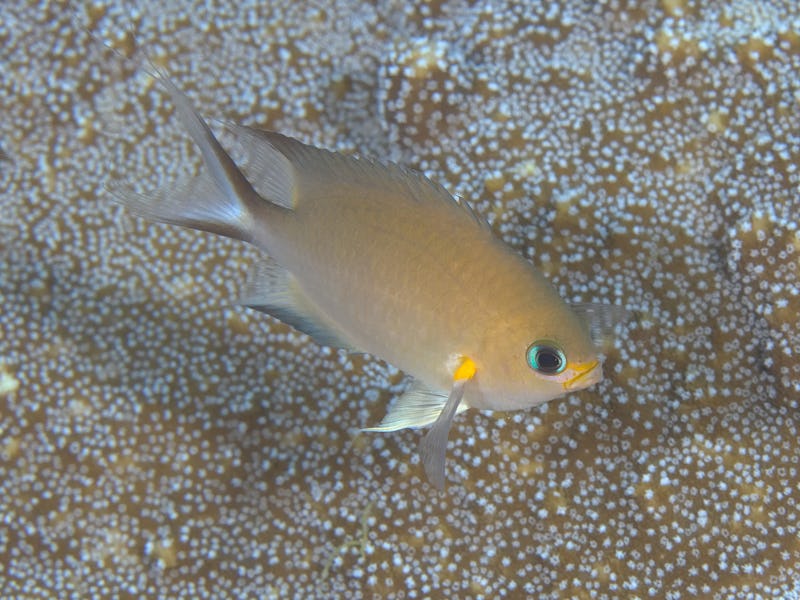Motorboat Noise Stresses Out Fish So Much They Are More Vulnerable to Predators
People are hurting ocean ecosystems in ways you'd never even consider.

The Ambon damselfish is in distress: The yellow fish is particularly vulnerable to predation in its adolescence, and noisy water makes it a lot worse. New research suggests that the fish are twice as likely to get gobbled up when the sound of nearby motorboats pollute the water.
The study, with authors hailing from the U.K., Australia, and Canada, was published this week in Nature Communications.
We’ve known for some time that noise from human activities affects marine wildlife. In an extreme example, beaked whales have occasionally died en masse in proximity to naval sonar experiments. But proving the link between cause and effect is challenging, even when you’re dealing with a number of whales stranded on a beach.
In many instances, the effect of noise on marine life is subtle, and it’s very difficult to show what the effects on a population level might be. That’s what makes this study particularly interesting — while the source of sound that was the subject of the experiment (motorboat noise) is very common and might seem benign, it’s effect on predation was dramatic.
A predatory dusky dottyback eyes up a juvenile Ambon damselfish.
The researchers subjected juvenile Ambon damselfish to motorboat noise in a series of experiments, both in tanks and in test reefs in the open water on the Australian coast.
The Ambon damselfish spends its young life floating in the sea currents, and then as a juvenile finds a suitable reef to settle down in. At this stage it is particularly vulnerable, since it is being exposed to a variety of new predators at the same time.
The scientists tested the relationship between the fish and the dusky dottyback, which uses an ambush technique to catch its meal. Both recorded boat noise and actual nearby motors dramatically upped the success of the dusky dottyback in killing the Ambon damselfish.
Researcher Stephen Simpson records motorboat noise while Mark Meekan drives by.
The researchers also measured the metabolic rate of the damselfish, showing that they consumed a lot more oxygen when motorboat noise fills the water. This elevated stress level could explain why the fish is less able to avoid predators in noisy water.
“Noise-induced stress could reduce the likelihood that prey detect the approach of predators, and thus do not react with an appropriately rapid startle response,” the authors write. In simulated attacks, the Ambon damselfish was six times less likely to startle in noisy water.
The dusky dottyback, on the other hand, did not appear to be bothered by the motors boats, at least not in a way that impacted its ability to make the kill.
While it’s very clear who the winner and who the loser is when you inject human-caused noise into this particular relationship, it’s impossible to extrapolate and guess at how motor boats might affect other species in other circumstances.
But it is clear that more attention should be paid to the ways that even small sources of noise can impact sea life. “Our study suggests that a common source of noise in the marine environment has the potential to impact fish demography, highlighting the need to include anthropogenic noise in management plans.”